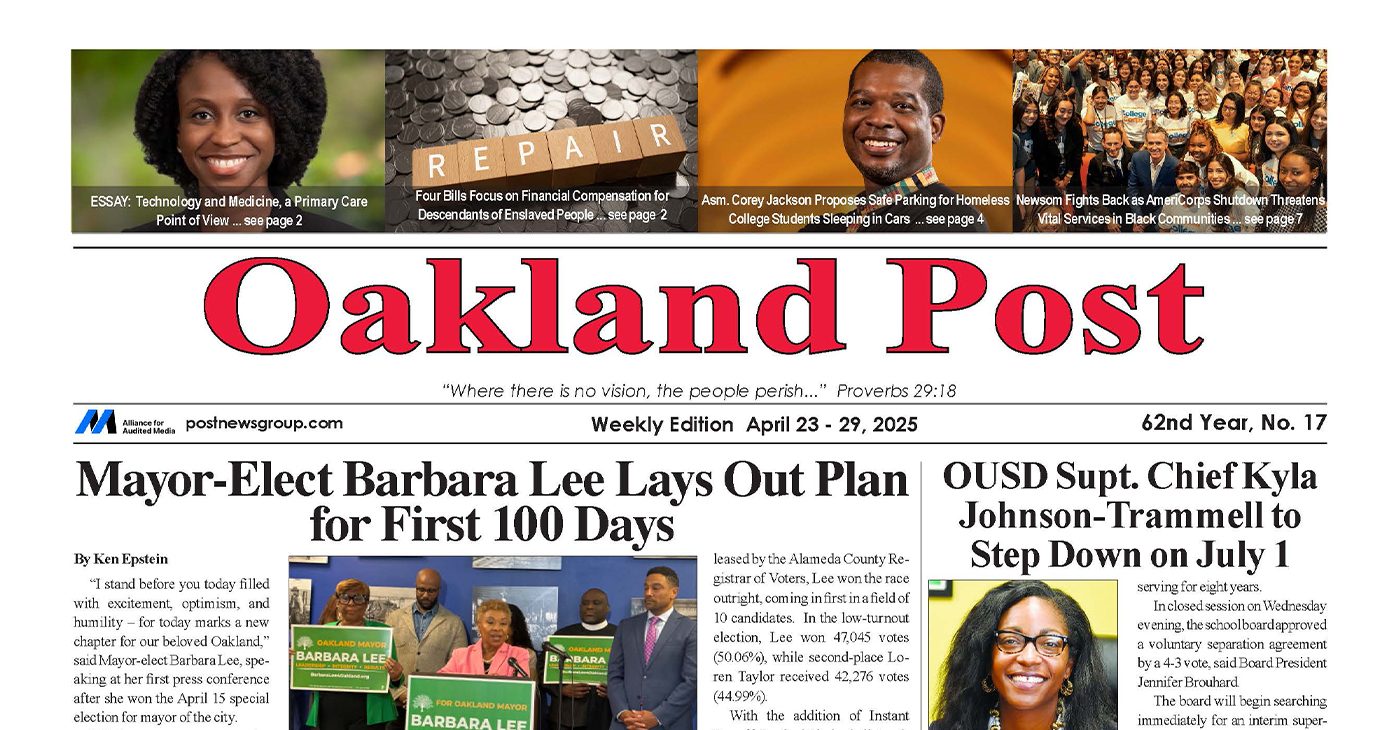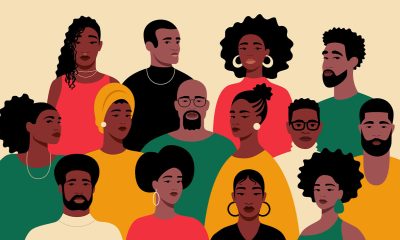National
North Carolina Looking Into ‘Black Tax’ At Charlotte’s Ritz-Carlton
Karen Grigsby Bates, NPR
CHARLOTTE, N.C. (NPR.com)—North Carolina Attorney General Roy Cooper has directed his Department of Consumer Affairs to look into reports that some African-American customers at the Ritz-Carlton in Charlotte were recently subjected to unwarranted fees.
We reported last week that the Ritz-Carlton had imposed a 15 percent surcharge for patrons in its Lobby Bar during the CIAA — Central Intercollegiate Athletic Association — tournament. The event involves basketball teams from historically black colleges and universities (HBCUs) from around the region and brings tens of thousands of people each year to Charlotte.
They come to cheer for their teams, party, dine out and enjoy mini-reunions with friends from their own and rival colleges. The Charlotte Regional Visitor’s Authority says CIAA week has infused almost $50 million into the local economy in recent years.
###
Activism
ESSAY: Technology and Medicine, a Primary Care Point of View
The COVID-19 pandemic, for example, restricted millions of people to their homes, which required reliance on the internet for communication and information. Personal internet searches became essential to understanding information about COVID, human physiology, symptoms, and keeping up with vaccine updates. However, this increase in independent online research resulted in people accessing more misinformation circulating on the internet. This posed a challenge for medical providers trying to treat patients according to research-based guidelines. With so much information within reach, it was difficult for providers to help their patients distinguish between legitimate evidence-based sources and opinion, speculation, and fabrication.

Dr. Adia Scrubb
Special to California Black Media Partners
Technology has enhanced communication between medical professionals and patients; improved patient care management; and eased access to care and information, benefiting both patients and medical clinicians.
However, despite the ease and many conveniences these patient care improvements have ushered in, adequate patient care still includes physician supervision, examinations, and interaction, which present challenges for keeping up with demands on the healthcare system and accurate patient education.
Technology has made more educational resources available at our fingertips, and it has created independence for those who want to know more about their bodies.
The COVID-19 pandemic, for example, restricted millions of people to their homes, which required reliance on the internet for communication and information. Personal internet searches became essential to understanding information about COVID, human physiology, symptoms, and keeping up with vaccine updates. However, this increase in independent online research resulted in people accessing more misinformation circulating on the internet. This posed a challenge for medical providers trying to treat patients according to research-based guidelines. With so much information within reach, it was difficult for providers to help their patients distinguish between legitimate evidence-based sources and opinion, speculation, and fabrication.
Nowadays, patients continuously arm themselves with medical information and challenge clinicians with the research they gather from internet sources to advocate for themselves and their care. This often leaves medical professionals with the complex task of navigating challenging discussions, pointing patients to validated and verified medical information, and following evidence-based medical guidelines for treatment.
Reviewing information before an appointment can certainly make an office visit much more productive, but it is essential to acknowledge the possible bias and limitations of internet searches. Consideration of the author, source, and date of the information may help determine its validity.
Furthermore, simply asking medical professionals for their preferred patient information resources will direct patients to safe and validated information that is in line with standards of care practices. This can help patients better understand the recommendations from their doctors and streamline their internet searches.
Access to individual online medical record information, such as blood tests, MRI reports, and office visit notes, has been a significant expansion of technology in medicine. This digitization of medical information enables and positions patients to take a leading role in managing their care. What used to be multiple sheets of paper in a large file folder is now a click away at any time. Despite these benefits, instant access can be overwhelming for both patients and medical providers, especially since patients, in many instances, can receive their test results online before the physician has had the opportunity to review them.
Patients may review the office visit notes or their lab results out of context or misinterpret information, which can lead to anxiety, confusion, and fear. Clinicians are put in a difficult position when they are not able to suddenly break away from their scheduled office visits to reassure an unscheduled patient about their results and next steps.
Medical providers have tools to assist with identifying sensitive results that need urgent review, and efforts are made to notify anxious patients as soon as possible. However, a patient can be proactive in scheduling a follow-up visit ahead of time to review results with their provider specifically. This can help patients avoid the stress of suddenly trying to get a hold of their doctor when dealing with unclear or concerning results. Normal test results often don’t require explanation, but allowing several days for your provider to work through hundreds of test results before sending messages requesting clarification will help medical professionals prioritize their responses to test results based on medical urgency.
Technological improvements such as online messaging and video/telephone appointments have made access to care much easier both for patients and clinicians. Telephone and video visits have been especially beneficial for patients who are elderly, disabled, or do not have access to transportation. However, the increase — and ease of — access has created much higher demand for physician time both during and outside of the office visit. Test results, patient messages, insurance forms, emails, and medication requests are all pouring in while providers conduct their daily scheduled appointments. Thus, very little time is left in the day for a clinician to respond to every email, fill out every form, and review every lab result when they are responsible for 1,800 or more patients.
This situation, unfortunately, creates a perceived delay in response in a culture where an instant response is expected from messaging and phone calls. But the reality is that the medical provider is constantly playing catch up to thousands of inquiries due to the around-the-clock online access patients now have.
Patients can make the most of their experience and their physician’s time by taking the time to learn their physician’s communication preferences. Despite the multiple modalities of access (telephone, email, video, in-person), a medical provider will have a preferred method of communication with their patients. Some may ask their patients to make an appointment to explain a complex topic, instead of responding to multiple messages. Others may prefer to communicate via phone call if they have to deliver bad news.
There will likely be more medical providers who prefer to communicate only through email or video appointments as remote work becomes more common. If a patient’s communication preferences align with their physician’s preferences, it will create a stronger patient-doctor relationship and foster more effective and impactful communication.
The expansion of technology in medicine has fostered better collaboration, communication, and education between patients and their medical professionals. Combining electronic resources with rapport, mutual respect, and trust for providers will help patients navigate this new landscape of healthcare.
About the Author
Dr. Adia Scrubb, MD, MPP, is a Board-Certified Family Medicine Physician currently practicing in Solano County.
Advice
Let’s Go to The Doctor: What Happens When Your Brain Gets Sick
As we grow older, it’s natural to feel concern about changes in our mental abilities. We want to carry out our daily routines, be self-sufficient and relive the most treasured moments of our lives – without having to worry about our memory and dementia.

Part 2 of 2
By Clifford L. Williams
“Everyone ages,” as noted by BlackDoctor.org (BD). The longer you live on Earth, the more you will notice how things change – including your body and mind.
Aging is a natural process of our lives, according to BD. As we age, we experience gradual changes to our brains and bodies. Some of these changes affect our physical and mental abilities and may increase our risk of disease.
Each one of us experiences aging differently. The extent of how we experience changes due to aging, and the point in our lives when they start becoming more noticeable, varies from person to person.
As we grow older, it’s natural to feel concern about changes in our mental abilities. We want to carry out our daily routines, be self-sufficient and relive the most treasured moments of our lives – without having to worry about our memory and dementia.
According to the World Health Organization (WHO) almost 40% of us will experience some form of memory loss after we turn 65 years old.
But even if we experience memory loss, chances are still unlikely that we have dementia. For the most part, our memory loss is mild enough that we can still live our day-to-day lives without interruption.
The WHO estimates that, after we turn 60 years old, 5% to 8% of us will live with dementia at some point. With dementia, symptoms including memory loss gradually worsen to the point where our abilities seriously deteriorate, and we are no longer able to take care of ourselves.
But dementia and Alzheimer’s are not the same. Dementia is a collection of symptoms, while Alzheimer’s is disease of the brain. It is the top neurodegenerative disorder in the world. The Centers for Disease Control and Prevention (CDC) estimates that 5.8 million Americans live with Alzheimer’s in the United States.
Early Signs of Alzheimer’s to Look Out For:
- Difficulty finding words, vision or spatial issues, and impaired judgment or reasoning
- Stuttering or halting speech, difficulty recalling words, or using substitutes for words
- Difficulty paying bills, cooking, or following a recipe
- Losing track of dates, getting lost in a familiar place, or having trouble understanding an event that’s happening later
- Becoming more easily upset, feeling depressed, scared, or anxious, or being suspicious of people
- Scaling back on projects at work, becoming less involved with hobbies, or lacking motivation
When it comes to enhancing our memory and cognitive abilities, engaging in brain games is an effective and enjoyable approach. Not only do these games provide entertainment, but they also stimulate various areas of the brain, leading to improved memory.
According to HealthDay News, a new drug to treat Alzheimer’s disease has been approved by the U.S. Food and Drug Administration. In clinical trials, donanemab (Kisunla), modestly slowed the decline in thinking among patients in the early stages of the disease.
With a diagnosis of dementia and seeking information about that illness, it can be both overwhelming and emotional. If you or a loved one has been diagnosed early, there is hope. You can plan for your care before your symptoms accelerate.
To Our Readers:
For information on other health-related issues regarding men’s health, please share your thoughts and/or concerns with the Post Newspaper Group editorial staff.
Activism
Oakland Post: Week of April 23 – 29, 2025
The printed Weekly Edition of the Oakland Post: Week of April 23 – 29, 2025

To enlarge your view of this issue, use the slider, magnifying glass icon or full page icon in the lower right corner of the browser window.
-

 Activism4 weeks ago
Activism4 weeks agoOakland Post Endorses Barbara Lee
-

 Activism3 weeks ago
Activism3 weeks agoOakland Post: Week of April 2 – 8, 2025
-

 #NNPA BlackPress3 weeks ago
#NNPA BlackPress3 weeks agoTrump Profits, Black America Pays the Price
-

 Activism2 weeks ago
Activism2 weeks agoOakland Post: Week of April 9 – 15, 2025
-

 #NNPA BlackPress3 weeks ago
#NNPA BlackPress3 weeks agoHarriet Tubman Scrubbed; DEI Dismantled
-

 #NNPA BlackPress3 weeks ago
#NNPA BlackPress3 weeks agoTrump Targets a Slavery Removal from the National Museum of African-American History and Culture
-

 #NNPA BlackPress3 weeks ago
#NNPA BlackPress3 weeks agoLawmakers Greenlight Reparations Study for Descendants of Enslaved Marylanders
-

 #NNPA BlackPress3 weeks ago
#NNPA BlackPress3 weeks agoNew York Stands Firm Against Trump Administration’s Order to Abandon Diversity in Schools
























































